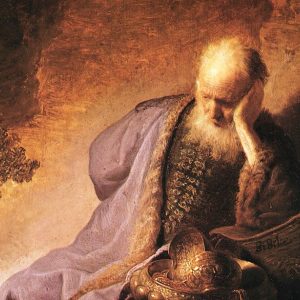Benedict Spinoza: This has been the year of post-truth in American politics; the year when facts, as the basic building blocks of public discourse, were eclipsed by something else: rumor, prejudice and the irrational. America is not alone. Around the world, propaganda feeds sectarian and nationalist hatreds breeding violence and instability.
The ideas of the Enlightenment, which provided the philosophical underpinning, for the Founding Fathers and the development of modern democracy, have been challenged by events that many in America still are having difficulty in understanding.
In this FRDH podcast Michael Goldfarb, looks at the life and thought of philosopher, Benedict Spinoza. Spinoza is one of the first Enlightenment philosophers and it was from him that the core ideas that motivated Jefferson, Madison et al sprung: the separation of Church and state, using philosophical reasoning to create a “tolerant” society where wise policies, freely debated, guide people toward “liberty.” Spinoza was the first philosopher to use “democracy” in the modern sense.
God Intoxicated Man combines biography, history and music to reclaim this important thinker for our troubled times and in doing so provide deep historical context for the struggle for the future going on in America and around the world.
This FRDH podcast looks at Spinoza’s life and how his revolutionary ideas grew out of the philosopher’s struggle with the Jewish community’s religious and social practices. Spinoza’s life spanned the history of the Golden Age of the Dutch Republic, the first modern experiment in a free trading, liberal, non-monarchical society. He watched as the Golden Age was undone by religious prejudice and the cynical maneuverings of those near the center of power. His writing was one long argument against those forces and it led to Spinoza being called the “renegade Jew from Hell.”
As the documentary unfolds it’s contemporary resonance becomes absolutely clear. In a time when rationalism as the foundation for government is under threat, it is important to be reminded of what happens to societies which abandon their commitment to having a public space where people of different views can, guided by dispassionate reason, find a way to work out their differences.
The FRDH Podcast is hosted by internationally acclaimed journalist Michael Goldfarb and is about History. The History he has reported on; the History he has written about; and the long History he has lived.
You can subscribe to the podcast on iTunes, YouTube and Soundcloud, and you can follow us on Facebook and Twitter.
The FRDH Podcast is hosted by internationally acclaimed journalist Michael Goldfarb and is about History. The History he has reported on; the History he has written about; and the long History he has lived.
You can subscribe to the podcast on iTunes, YouTube and Soundcloud, and you can follow us on Facebook and Twitter.
You can also donate to keep the episodes coming.
